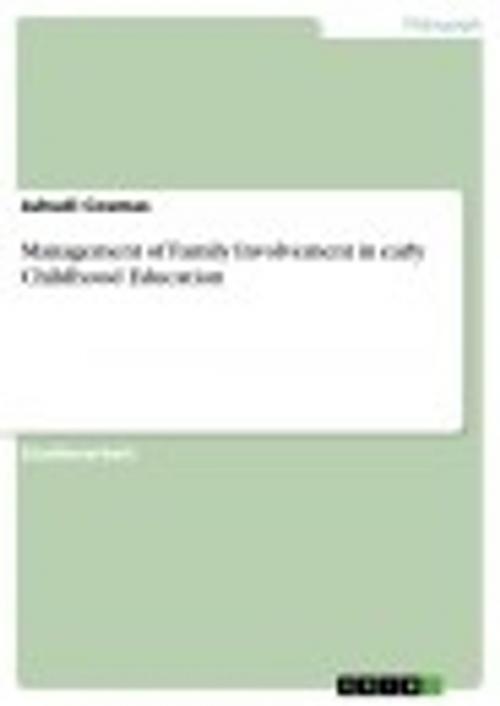Management of Family Involvement in early Childhood Education
Nonfiction, Reference & Language, Education & Teaching, Preschool & Kindergarten| Author: | Juhudi Cosmas | ISBN: | 9783656195696 |
| Publisher: | GRIN Verlag | Publication: | May 22, 2012 |
| Imprint: | GRIN Verlag | Language: | German |
| Author: | Juhudi Cosmas |
| ISBN: | 9783656195696 |
| Publisher: | GRIN Verlag |
| Publication: | May 22, 2012 |
| Imprint: | GRIN Verlag |
| Language: | German |
Studienarbeit aus dem Jahr 2012 im Fachbereich Pädagogik - Kindergarten, Vorschule, frühkindl. Erziehung, , Sprache: Deutsch, Abstract: Management of family involvement in the early childhood education is important because early childhood years are the period during which children acquire the basic skills that serve as the foundation for later learning, and social and cognitive development. Moreover, these years are the time when families' beliefs about their children's abilities are shaped and when children's own academic self-concepts begin to form. Therefore, management of family involvement in the early childhood education matters for young children's cognitive and social development, and learning. The ultimate goal of management at any level of education is the attainment of children's learning and holistic children development. Therefore, early childhood education should be structured and managed in such a way that family members are involved to facilitate children's holistic development and learning. That is, the early childhood context should be supportive and effective for family involvement in the early childhood education to enable children acquire appropriate social and cognitive skills. It should be noted that management of early childhood education is a critical issue as it involves golden age of intellectual curiosity and development of the children. Family is the major component for children growth and development in all aspects it interacts with children throughout their life. The research studies link effective family involvement in early childhood education with good children's outcomes. Children's outcomes are likely to include social competence, cognitive development, communication skills, literacy development, vocabulary growth, expressive language, comprehension skills and positive engagement with peers, adults, and learning. Therefore, this work supports the ideas that decision to invest in family support and education services is an effective way to promote early childhood learning. Family needs strong support and education programs that improve their involvement in children's early learning experiences at home and that connect families to important community services. In addition, these efforts also require that schools are ready to meet each child's needs and continue to maximize opportunities to engage families in their children's education and well-being in preschools and beyond.
Studienarbeit aus dem Jahr 2012 im Fachbereich Pädagogik - Kindergarten, Vorschule, frühkindl. Erziehung, , Sprache: Deutsch, Abstract: Management of family involvement in the early childhood education is important because early childhood years are the period during which children acquire the basic skills that serve as the foundation for later learning, and social and cognitive development. Moreover, these years are the time when families' beliefs about their children's abilities are shaped and when children's own academic self-concepts begin to form. Therefore, management of family involvement in the early childhood education matters for young children's cognitive and social development, and learning. The ultimate goal of management at any level of education is the attainment of children's learning and holistic children development. Therefore, early childhood education should be structured and managed in such a way that family members are involved to facilitate children's holistic development and learning. That is, the early childhood context should be supportive and effective for family involvement in the early childhood education to enable children acquire appropriate social and cognitive skills. It should be noted that management of early childhood education is a critical issue as it involves golden age of intellectual curiosity and development of the children. Family is the major component for children growth and development in all aspects it interacts with children throughout their life. The research studies link effective family involvement in early childhood education with good children's outcomes. Children's outcomes are likely to include social competence, cognitive development, communication skills, literacy development, vocabulary growth, expressive language, comprehension skills and positive engagement with peers, adults, and learning. Therefore, this work supports the ideas that decision to invest in family support and education services is an effective way to promote early childhood learning. Family needs strong support and education programs that improve their involvement in children's early learning experiences at home and that connect families to important community services. In addition, these efforts also require that schools are ready to meet each child's needs and continue to maximize opportunities to engage families in their children's education and well-being in preschools and beyond.















